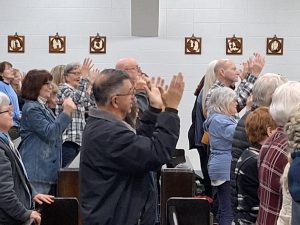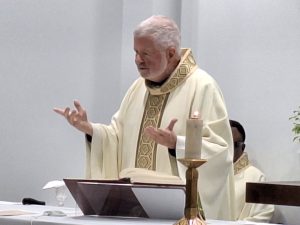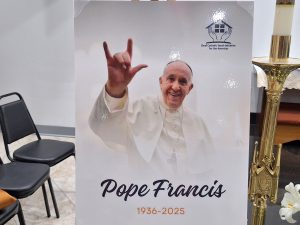Deaf Catholics pay tribute to pope
By Kevin Beese Staff Writer — April 27, 2025
Deaf Catholics sign “Alleluia” at the end of a Mass on Friday to remember the life of Pope Francis, who died Monday. The Mass was at the St. Francis Borgia Deaf Center in Chicago. (Kevin Beese/Chronicle Media photos)
Rev. Joe Mulcone remembers being part of a conference for deaf Catholics around the world held in Rome.
“We hoped, we hoped that the pope would show up,” Mulcrone said of the 2018 conference. “Well, we got a message on Monday saying, ‘We’re meeting Wednesday morning at 8 o’clock with the pope. Be there.’ I think that most of us were there at 6 o’clock in the morning.”
Mulcrone said the deaf Catholics shared the audience with the pope with youth from Special Olympics.
After the pope hugged and talked to the Special Olympians, Mulcrone remembered, he then came over to communicate with the deaf Catholics through sign language interpreters.
When several deaf Catholics said “I love you” to the pope in sign language, he asked one of his aides, “What are they doing?”
Being told by the aide what the signing meant, the pope asked, “Can I do that?” Mulcrone recalled. “I said, “You’re the pope. You can do whatever you want.’”
Mulcrone, who has lead the Archdiocese of Chicago’s Ministry Formation Program for Deaf Catholics for more than 30 years, said quickly learning sign language for “I love you” showed where the pope’s priorities were.

Rev. Joe Mulcrone uses sign language during the memorial Mass for Pope Francis.
“To him, who was important? The people who are wealthy or successful or powerful? The big dealers?” Mulcrone asked during a Mass on Friday night at the St. Francis Borgia’s Deaf Center in Chicago to remember the life of Pope Francis, who died Monday. “No, for the pope, you and other people like you were the center of his life.
“He was interested and hopeful for every person in the world to feel God’s love and to know God’s love, and that God loves you as God loves any person in this world. So when the pope signed ‘I love you,’ he meant it and wanted us to understand that’s not only his love, but Jesus’ love.”
Mulcrone, who also met Pope Francis two years ago during a gathering with 500 other priests, said it is sad to lose an influential leader like the pope.
“It is sad when you see what he has done and who he has been,” Mulcrone said, “but he died the day after Easter. How can you be sad about that?
“He had a great life and touched so many people. There is no more sickness for him. Cardinal Kevin Farrell (acting head of the Vatican) said it best, ‘He went to his father’s house.’”
Mulcrone is currently in Italy, leading a group of 30 deaf and disabled Catholics on a visit to the Vatican as part of the Catholic Church’s Jubilee Celebration.

A photo of Pope Francis signing “I love you” was displayed at Friday’s remembrance Mass.
Having the planned visit fall over the days following Pope Francis’ death has impact, Mulcrone said, noting the Chicago congregation would be at the Vatican for the novenas that occur for eight days after the death of a pope.
The group will also spend time in Italy outside Vatican City, returning May 5.
“Most of these people have not been outside the United States, so it will be a magical trip for them,” Mulcrone said.
He planned to present the Vatican with a guest book of condolences from congregants of the Deaf Ministry at St. Francis Borgia.
The longtime priest said he contacted the Chicago Bears prior to his 2018 conference in Rome and Brian McCaskey, a member of the Bears’ Board of Directors, had a Bears jersey with “Pope Francis” and number 1 on the back.
“I gave it to him and he was laughing about it,” Mulcrone said. “He would greet you like a brother or a sister.”
When Mulrcone met the pope five years later, he was the same individual, according to the Chicago priest.
“He would say ‘Hello’ and ask ‘How are you?’” Mulcrone remembered. “There was never of sense of he was important because he’s the pope. That was just the way with him.”
Pope Francis cared abut the people on the margins of society, Mulcrone said, noting that is why the pope was a leader in his concern for immigrants.
“His parents were refugees. He had the initial experience of leaving Italy and going to a foreign country to live,” Mulcrone said. “He did not grow up in his home country.
“He lived a simple life. He would go on public transportation. There was nothing about him that said, ‘Look at me. I’m the pope.’ He did not live his life that way. He lived the immigrants’ life. To him, that was what mattered, to be with the people.”
kbeese@chronicleillinois.com







